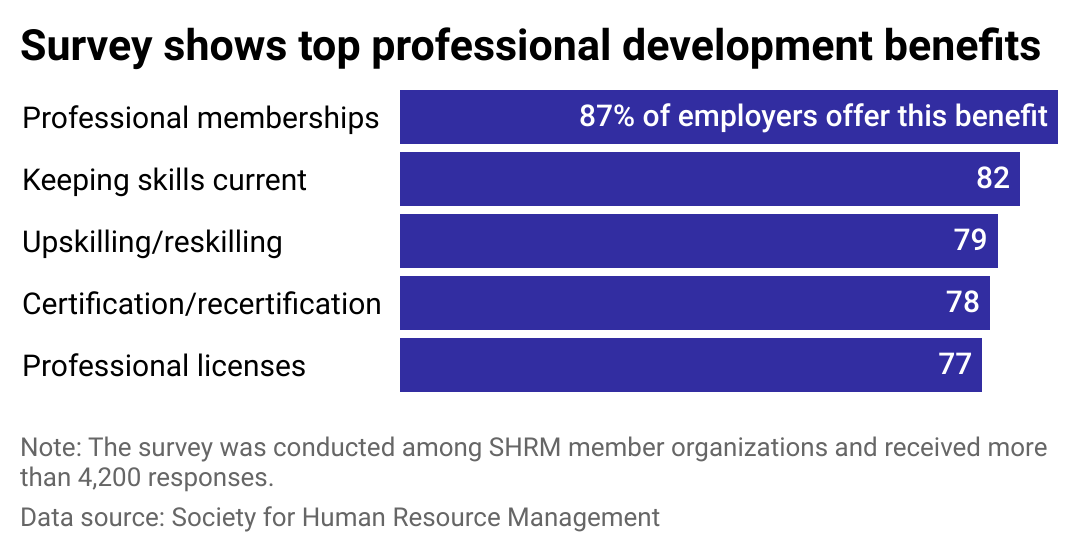
5 of the most common professional development benefits
This story originally appeared on Xactly and was produced and distributed in partnership with Stacker Studio.
5 of the most common professional development benefits
When the competition for talent is fierce, employers need to find ways to improve staff retention and be attractive to potential employees.
Professional development can be a win-win benefit—employees develop skills they need to achieve their career goals, while companies improve efficiency and stay on top of changes in technology and the marketplace.
More than 8 in 10 employees expect employers to provide some form of professional development so they can improve their skill sets in ever-changing work environments, according to edX. Many employees might pursue professional development opportunities because they enjoy the challenge of learning something new, hope to improve their performance, or are working toward a promotion.
Xactly identified some of the top professional development benefits that employers offer their staff, based on data from a 2023 survey by the Society for Human Resource Management.
Companies that invest in their staff development may find that it pays dividends in the form of job satisfaction and employee retention. A 2023 University of Phoenix study found that 53% of workers want to leave their companies, but if companies provided more learning opportunities, 68% of that group would stay. Finding new hires can be expensive—it costs on average nearly $4,700 to hire a new employee, according to SHRM, but the true cost is much higher when companies factor in other soft costs like the time teams and managers spend on screening and interviews.

Employers focus on skills, memberships, and licenses
The job market is still tight—there were close to 9 million job openings in February 2024, nearly 32% more than in 2020, according to the Bureau of Labor Statistics—so companies have looked to professional development benefits as a way to set them apart from the competition. This includes a resurgence in paying for professional memberships, certification and recertification, and professional licenses. More companies invested in these benefits in 2023 than in the past five years, per SHRM.
Professional memberships help employees keep abreast of industry trends, and they also provide opportunities to get involved with committees and develop leadership skills. Certifications are a way for employees to develop and prove that they can apply knowledge to situations they encounter at work. They can be necessary in many tech roles, particularly when new technologies come to the forefront, as well as other roles like human resources and project management.
Training has also become a vital benefit. It's natural for jobs to evolve, but technology—and AI in particular—is making some of today's jobs obsolete. Employees say that AI can take over almost one-third of their job duties, according to a study by Asana. Training workers can help companies better embrace changes happening in the industry and improve employee efficiency.
Upskilling helps employees develop advanced technical skills and improve soft skills that will boost their performance and build their capabilities. Companies can offer different types of training, including in-person development, online classes, and self-paced study. Employers should note that one size doesn't fit all when it comes to professional development. For example, millennials typically enjoy online learning, while Gen Z prefers an individualized approach through coaching, according to edX.
Companies that help their employees leverage these benefits effectively can reap the benefits of a staff with higher job satisfaction. This investment can also provide further benefits by building up a company's leaders and paving the path for a stronger future.
Story editing by Ashleigh Graf. Copy editing by Tim Bruns.



